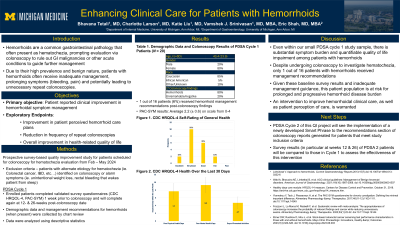Sunday Poster Session
Category: Colon
P0241 - Enhancing Clinical Care for Patients With Hemorrhoids
Sunday, October 27, 2024
3:30 PM - 7:00 PM ET
Location: Exhibit Hall E

Has Audio
- CL
Charlotte Larson, MD
University of Michigan
Ann Arbor, MI
Presenting Author(s)
Bhavana Tetali, MD, Charlotte Larson, MD, Katie Liu, MD, Vamshek Srinivasan, MD, MBA, Eric Shah, MD
University of Michigan, Ann Arbor, MI
Introduction: Hemorrhoids are a common gastrointestinal issue often presenting as hematochezia. Patients with hematochezia are recommended to undergo colonoscopy to rule out cancer, and frequently these colonoscopies are normal except for hemorrhoids. Due to the high prevalence and generally benign nature of hemorrhoids, patients often do not receive adequate management guidance, which may lead to continued bleeding, discomfort, and potentially anemia, leading to unnecessary repeat colonoscopies. We developed a quality improvement project to enhance clinical care for hemorrhoid patients, focusing on symptom improvement. Exploratory endpoints include better patient perception of care, improved quality of life, and reduced repeat colonoscopies.
Methods: In the first Plan-Do-Study-Act (PDSA) cycle, we prospectively enrolled patients scheduled for colonoscopy for evaluation of hematochezia from February to May 2024. Patients with hemorrhoids or negative colonoscopy findings were included; those with alternate explanations for hematochezia were excluded. We collected demographic data (age, sex, ethnicity, race) and noted if clinical management recommendations were provided. Approximately one week before their colonoscopy appointment, patients completed validated survey questionnaires (CDC-4 and PAC-SYM) and will complete them again at 12- and 26-weeks post-colonoscopy. Data were analyzed using descriptive statistics.
Results: We enrolled 20 patients: 80% female, mean age 43.4 (±13.9) years. The majority were Caucasian (85%), with 5% African American and 10% other or unknown. Most were non-Hispanic (90%). Hemorrhoids were found in 80% of patients, while 20% had negative colonoscopy results. Only 5% received hemorrhoid management guidance. On the PAC-SYM questionnaire, patients averaged 26.4 points. CDC-4 survey results indicated that 10% reported "Excellent," 50% "Very Good," 30% "Good," and 10% "Fair" overall health. In the past 30 days, patients averaged 7.6 days of poor physical health, 9.3 days of poor mental health, and 4.7 days where poor health hindered usual activities.
Discussion: Our analysis revealed insufficient hemorrhoid management guidance, notable symptom burden, and impaired quality of life among patients with hemorrhoids. For next steps, we have developed a Smart Phrase to include in the colonoscopy recommendations for patients with hemorrhoids and plan to implement it during PDSA cycle 2. The authors would like to disclose ChatGPT assistance with syntax for this abstract.
Disclosures:
Bhavana Tetali, MD, Charlotte Larson, MD, Katie Liu, MD, Vamshek Srinivasan, MD, MBA, Eric Shah, MD. P0241 - Enhancing Clinical Care for Patients With Hemorrhoids, ACG 2024 Annual Scientific Meeting Abstracts. Philadelphia, PA: American College of Gastroenterology.
University of Michigan, Ann Arbor, MI
Introduction: Hemorrhoids are a common gastrointestinal issue often presenting as hematochezia. Patients with hematochezia are recommended to undergo colonoscopy to rule out cancer, and frequently these colonoscopies are normal except for hemorrhoids. Due to the high prevalence and generally benign nature of hemorrhoids, patients often do not receive adequate management guidance, which may lead to continued bleeding, discomfort, and potentially anemia, leading to unnecessary repeat colonoscopies. We developed a quality improvement project to enhance clinical care for hemorrhoid patients, focusing on symptom improvement. Exploratory endpoints include better patient perception of care, improved quality of life, and reduced repeat colonoscopies.
Methods: In the first Plan-Do-Study-Act (PDSA) cycle, we prospectively enrolled patients scheduled for colonoscopy for evaluation of hematochezia from February to May 2024. Patients with hemorrhoids or negative colonoscopy findings were included; those with alternate explanations for hematochezia were excluded. We collected demographic data (age, sex, ethnicity, race) and noted if clinical management recommendations were provided. Approximately one week before their colonoscopy appointment, patients completed validated survey questionnaires (CDC-4 and PAC-SYM) and will complete them again at 12- and 26-weeks post-colonoscopy. Data were analyzed using descriptive statistics.
Results: We enrolled 20 patients: 80% female, mean age 43.4 (±13.9) years. The majority were Caucasian (85%), with 5% African American and 10% other or unknown. Most were non-Hispanic (90%). Hemorrhoids were found in 80% of patients, while 20% had negative colonoscopy results. Only 5% received hemorrhoid management guidance. On the PAC-SYM questionnaire, patients averaged 26.4 points. CDC-4 survey results indicated that 10% reported "Excellent," 50% "Very Good," 30% "Good," and 10% "Fair" overall health. In the past 30 days, patients averaged 7.6 days of poor physical health, 9.3 days of poor mental health, and 4.7 days where poor health hindered usual activities.
Discussion: Our analysis revealed insufficient hemorrhoid management guidance, notable symptom burden, and impaired quality of life among patients with hemorrhoids. For next steps, we have developed a Smart Phrase to include in the colonoscopy recommendations for patients with hemorrhoids and plan to implement it during PDSA cycle 2. The authors would like to disclose ChatGPT assistance with syntax for this abstract.
Disclosures:
Bhavana Tetali indicated no relevant financial relationships.
Charlotte Larson indicated no relevant financial relationships.
Katie Liu indicated no relevant financial relationships.
Vamshek Srinivasan indicated no relevant financial relationships.
Eric Shah: Abbvie – Consultant. Ardelyx – Consultant. Cook – Consultant. Laborie – Consultant. Mahana – Consultant. Mylan – Consultant. Neuraxis – Consultant. Salix – Consultant. Sanofi – Consultant. Takeda – Consultant.
Bhavana Tetali, MD, Charlotte Larson, MD, Katie Liu, MD, Vamshek Srinivasan, MD, MBA, Eric Shah, MD. P0241 - Enhancing Clinical Care for Patients With Hemorrhoids, ACG 2024 Annual Scientific Meeting Abstracts. Philadelphia, PA: American College of Gastroenterology.

